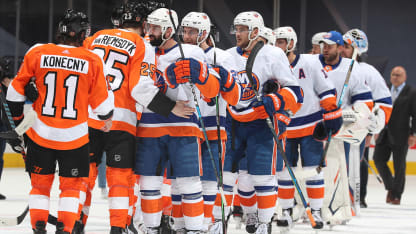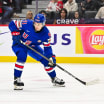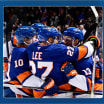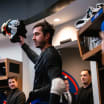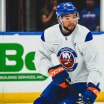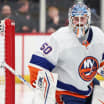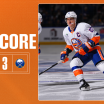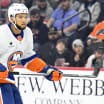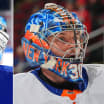As much as the Isles defense and structure has been their calling card under Barry Trotz, it's their offense that was a constant over the Flyers in the second round.
The Islanders scored at least three goals in every game and have scored three-or-more goals in eight-straight contests dating back to their series clincher vs the Capitals. The Isles are 9-3 when scoring three goals and 2-2 when they do not.
They're not just scoring a lot for a defense-first team, they're averaging 3.38 goals-per-game in the postseason, first among remaining teams and third of the 24-team field that entered the bubble.
Eleven different Islanders found the back of the net vs the Flyers, and 18 of 20 skaters recorded at least a point. Brock Nelson led the Isles with eight points (4G, 4A) in the series, as their top-six forwards stepped up.
"We've had a pretty balanced scoresheet up and down our roster, contributions from the D today, every line getting in on it," Nelson said after Game 7. "Guys stepping up and making plays at the right time. We're doing good things to create some chances and capitalize on them. I think we've had that strategy and results for a couple of series now and that's part of the reason we're here today."
The top line was especially good. Mathew Barzal had six points (2G, 4A) - and showed a lot of grit playing through various stick cuts and extra attention from the Flyers - while Anders Lee (4G) and Jordan Eberle (6A) consistently created quality looks in each game. As a trio, the Lee-Barzal-Eberle line was on the ice for 33 high-danger chances for and only 14 against at five-on-five in the series.
Josh Bailey finished the series with six points (2G, 4A) and leads the team with 17 points (2G, 15A) in the series, one assist shy of the league lead. Anthony Beauvillier had three points (2G, 1A) and Derick Brassard notched five points (2G, 3A) in five games after being scratched early in the series.
It wasn't just the skill guys getting it done for the Isles either. Matt Martin (2G), Andy Greene (2G), Scott Mayfield (1G) and Leo Komarov (1G) combined for six tallies, helping the Isles get over the hump in Games 3 and 7.
